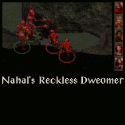|
The two ways to avoid "players do nothing because they're afraid their miss means something bad" is a) make the bad thing something fun to play through, and b) make sure the bad thing for one miss is not cataclysmic. The issue you bump into is a playstyle problem. In more dungeon crawl based games - your OD&Ds - the whole point of the game was to avoid anything bad happening, ever, at any point in time, forever. OD&D was a game where a group of adventurers try desperately to be boring and the dungeon tries to be exciting. Exciting kills, so you want boring. But that's boring so the DM hits you with exciting. It's why the "pro strategies" of those games always sound so awful and lifeless, tapping each square with the eleven foot poll before stepping five feet. It's why you have monsters that live inside doors so they can burrow into your ear when you try to listen through the door. Because the ideal victory was "seven guys walked into a dungeon and left with gold and nothing happened between those two events." In this situation, a miss that does nothing is entirely understandable. "I did nothing" is a bad thing in of itself. Every time "I did nothing" happens, you will have lost resources in some way, and the entire point of th egame is to slowly remove your resources so you have to strategize how you enter or exit the dungeon. The problem is, this way of game is not for everyone. It's not for a lot of people. Remember the anecdote earlier of the tournament game where everyone lost because they all just walked into death, because tournament style gameplay was not what they did. I think to some degree, what D&D lacks is buy in. For all the whinging about video games, the OD&D dungeon crawler style game is video game as gently caress. D&D needs to have that buy in that tells you up front: the point of this game is to have exciting adventures. It needs to tell the DM and the PCs that. In the PHB and the DMG. "A bad thing happens if you miss" is absolutely ok if a) the bad thing is exciting, and b) one bad roll does not kill you. I won't make this a Dungeon World Thread Thing, but I will say that there is also a c there. c) A bad thing can also have a good thing connected. In Dungeon World, a bad thing (can) happen when you miss - but you also get XP! In one game I'm in, I roll like poo poo. And when I miss, a bad thing happens, and it's exciting. Also, I'm kinda unhappy, because it's exciting but also really unfun to have your character just get poo poo on all the time because you roll awful. You want to mix the bad and good together for when you get those poo poo roll streaks. In a FATE game I'm in, one dude has just had the worst luck ever with his rolls - and he isn't enjoying it! So Dungeon World's XP thing does do something really, really smart - "if you roll poo poo, you get XP." Think of it as a consolation prize, except it rather is a nice prize. The other problem D&D has is that it lacks degrees of failure and success. As Rulebook said long ago in this thread, D&D is really loving dumb because it has a million and one systems all tied into a single binary pass or fail. Skills points, skill dice, attribute scores, class abilities, class bonuses, spell bonuses, item bonuses, aid another, and so on, and so forth, all so you can get a "yes you made it / no you hosed up." Adding something more to that - so that you don't jst get a pass/fail, but also a measure of success or fail, would make missing more interesting. What if a miss still brought you closer to your victory but not in a substantial way you wanted? What if you just barely eeked out a victory, so the bad thing is still right on your heels? Or the opposite - you roll a TITANIC miss and things get hosed, you roll an incredible success and get some sort of bonus to other poo poo. That makes missing - and successes! - way more exciting! It makes rolling more exciting. If there were a way to combine these two (the bigger the failure, the more or better consolation prize you get?) that would work really well. The problem is that this is super loving meta, and D&D has traditionally been staunchly against meta-mechanics on this level. It also has the potential to be very complex where it SHOULD be simplistic and easy.
|
|
|
|

|
| # ? Jun 10, 2024 20:55 |
|
Maxwell Lord posted:Perhaps making it a choice on the player's part might be interesting. If you roll a miss, you can choose to just have it be nothing happens- a bit bland, but safe- or you can make it so that you have some effect but with a negative consequence. It depends on whether you want to play it conservative or open yourself up to risk- could even make it part of a maneuver/stance system. This is actually a neat way to approach it by making a miss something that gives a choice to the player. On the more general topic, something I just remembered from Essentials: suddenly wizards (and mostly just wizards) didn't have "nothing happens" conditions on missing with any of their powers, encounters or at-wills included. Someone realized that not hitting was boring and bad, but only chose to fix the problem within one specific class in that way. And isn't that just the way of things? Spells autohit because not hitting is boring, but everyone else has to roll.
|
|
|
|
What a timely L&L... http://wizards.com/dnd/Article.aspx?x=dnd/4ll/20130729 "Itís Mathemagical!" Actually a lot of info in there. Building your own subclasses is mentioned. An earlier podcast mentioned Gladiator and Swashbuckler subclasses are in for Fighter; this article implies you can mix their features to make your own subclass. Basically the math is a clusterfuck and now they are going back to tweak save DCs and skills. Which is good because both of those were pretty drat broken.
|
|
|
|
Mike Mearls posted:Since AC, attack, and saving throw numbers don't grow too much, low-level monsters can still hit and damage you (though for a smaller portion of your hit points) as you reach higher levels. Based on the test runs that I did, this means that gangs of low-level trash monsters like rats and kobolds are going to be just as deadly to even high-level PCs as a dragon, because the system inherently leads to lots of "I attack"/"You miss" rolls for players. Since all monsters get at least a free +3 to-hit bonus and lots of them also get things like Pack Tactics to boost their chances, you end up with long and boring battles where the drat things have to be picked off one by one as they gradually whittle down the PCs' hit points. The only way to avoid it is to nova trash gangs on sight, leading to casters having to be Sleep Spells Guy rather than anything interesting.
|
|
|
|
Payndz posted:How very... un-D&D. The entire 5E tactical game is tactical nukes anyway.
|
|
|
|
Payndz posted:How very... un-D&D. If they want to be old school, I believe OD&D fighters, as they got higher level, gained a number of level 0 enemies killed per round. As in, on their turn, a number of those low level trash monsters just loving died for being next to the fighter.
|
|
|
|
Either one or both of 1e/2e had a "follow through" thing for fighters, where if you were fighting creatures of (less than a number) of hit dice, and you killed one, the leftover damage "followed through" onto the next one, and the next one, and so on. I've run houseruled AD&D with the follow-through hd limit being "your level divided by whatever" and that was cool. I think we were most successful with the hit dice limit being level/3 or maybe level/4, rounding down (to the nearest half, because of 1/2hd monsters). It made hordes of little creatures dangerous but surmountable opponents, and back then we didn't know that there were better ways to handle swarms/mobs/whatever.
|
|
|
|
Payndz posted:How very... un-D&D. ProfessorCirno posted:If they want to be old school, I believe OD&D fighters, as they got higher level, gained a number of level 0 enemies killed per round. As in, on their turn, a number of those low level trash monsters just loving died for being next to the fighter. AlphaDog posted:Either one or both of 1e/2e had a "follow through" thing for fighters, where if you were fighting creatures of (less than a number) of hit dice, and you killed one, the leftover damage "followed through" onto the next one, and the next one, and so on. The Next team can't even idea mine their own previous editions properly. Splicer fucked around with this message at 11:35 on Jul 29, 2013 |
|
|
|
The future is the past, but only the bits we most vigorously remember because when we were eight we thought they were awesome, when in fact they only really stuck in their mind because they were game-bendingly lovely, and thus memorable.
|
|
|
Payndz posted:How very... un-D&D.
|
|
|
|
|
As someone elsewhere put it, for an edition that's ostensibly supposed to be D&D: Greatest Hits Compilation Edition, the Next dev team is astonishingly reluctant to actually just wholesale take things out of previous editions even if those things would accomplish what they're looking to accomplish or solve the problems that they design themselves into. Instead they seem determined to derive every bit of design the hard way.
|
|
|
|
ProfessorCirno posted:The two ways to avoid "players do nothing because they're afraid their miss means something bad" is a) make the bad thing something fun to play through, and b) make sure the bad thing for one miss is not cataclysmic.
|
|
|
|
Splicer posted:As I was reading this I was thinking "Jeeze how hard could it be to come up with some kind of overkill mechanics where if you kill a trash mob you can continue through to the other trash mobs" and then...
|
|
|
|
Ewen Cluney posted:The thing about old-school D&D is, I get that it's a style that many people find appealing, but I really don't understand how being totally the opposite of all of its source material wasn't more of an impediment to its success. It's really easy to imagine a Lord of the Rings fan getting 15 minutes into playing and going, "Hey, is there maybe another game like this but where I get to pick what kind of character I play, where he gets to do something actually interesting, and where he isn't so lame that he dies instantly for no good reason?" I think that the idea was that the heroes depicted in Lord of the Rings or other books would be represented by high level characters in D&D. You have to earn your heroism after all.
|
|
|
|
Ewen Cluney posted:The thing about old-school D&D is, I get that it's a style that many people find appealing, but I really don't understand how being totally the opposite of all of its source material wasn't more of an impediment to its success. It's really easy to imagine a Lord of the Rings fan getting 15 minutes into playing and going, "Hey, is there maybe another game like this but where I get to pick what kind of character I play, where he gets to do something actually interesting, and where he isn't so lame that he dies instantly for no good reason?" Rexides posted:I think that the idea was that the heroes depicted in Lord of the Rings or other books would be represented by high level characters in D&D. You have to earn your heroism after all. It's actually far simpler then that: they ignored the rules when they didn't work. It's been a long standing "tradition" of D&D for people to completely ignore or rewrite the rules as they saw fit. And indeed, for awhile, it was tradition (of sorts) to then try publishing those same rules. A lot of early fantasy games came from disillusionment with D&D. At the time there really weren't any other games, unless you made one. So people did so. It's why trying to build off of older editions is so iffy - because most fans of older editions themselves have no idea how the rules worked. They didn't use them! I've seen people in ENWorld through big hissy fits about how they're proud old school gamers and young gamers these days are just entitled spoiled children and blah blah blah, and then they turn around and end up getting half the rules of their own game wrong.
|
|
|
|
Deadly Strike is on the way out and replaced with multiple attacks. So instead of doing 2x/3x damage you get 2+ swings. They did that to spread out overkill damage when fighting multiple opponents. Also: @Last_Question Pretty confused by your column. Is it three separate bonuses, and do different classes still grow them at different rates? @mikemearls you either get no bonus or a bonus that ranges from +1 to +6. In a few very specific cases, you get double the bonus. @mikemearls all classes get the same bonus for attacks, but it only applies to weapons you are proficient wit That sounds like 4e's flat +1 every two levels. In this case it's every four levels.
|
|
|
|
ProfessorCirno posted:It's why trying to build off of older editions is so iffy - because most fans of older editions themselves have no idea how the rules worked. They didn't use them! I've seen people in ENWorld through big hissy fits about how they're proud old school gamers and young gamers these days are just entitled spoiled children and blah blah blah, and then they turn around and end up getting half the rules of their own game wrong. I played 4e with a friend of mine this weekend who hasn't played D&D since he was 15. There were a lot of benign grogisms that drifted across the table as we argued about Sneak Attack. "This is like a videogame", for one, "this doesn't feel like D&D" for another. He had fun but he felt disconnected from all the poo poo we were doing. "I remember 2e", he said later, "It was much more about the roleplaying. All this stuff boxes you in and makes you feel like you can't do anything." When I asked him what rules that allows characters to do cool stuff he was referring to, he was flabbergasted. "Ability checks", he said. "And Proficiencies." When I pointed out AD&D's non-weapon proficiency system and Ability Checks were pretty prohibitive (even when we busted out the books, which I happened to have lying around the house) he conceded it wasn't the way he remembered. "We used to play with higher Ability Scores. 4d6, drop the lowest, add 2d6 points to your scores as you liked." Which resulted in crazy powerful characters, to say nothing of all the 'stunting' rules that his table made up to accommodate non-attack actions. Incidentally my friend would be a branded member of Next's target demographic. But he took one look at it and decided that the feats were just as complicated as 4e and that the system was still too gamist for his taste. I don't know why Next didn't start with a simpler base game.
|
|
|
|
Mendrian posted:I played 4e with a friend of mine this weekend who hasn't played D&D since he was 15. There were a lot of benign grogisms that drifted across the table as we argued about Sneak Attack. "This is like a videogame", for one, "this doesn't feel like D&D" for another. He had fun but he felt disconnected from all the poo poo we were doing. And this is Next's problem in a nutshell. To hit its actual target audience (which I think your friend is typical of) it needs to be The D&D That Never Was. Every table's ring binder full of house rules merged into one. Mearls appears to be trying to bring out one specific ring binder (close to the one he used) and make that everyone's ring binder. And I think your friend would probably love Dungeon World. Edit: And because I haven't mentioned it earlier: Low saves that range from +0 to +6 by level and high saves that can be double that. Where have we seen that before?
|
|
|
|
ritorix posted:@mikemearls all classes get the same bonus for attacks, but it only applies to weapons you are proficient with So you start out your career and you're good with some weapons and decent with others. As you fight and fight, you get better and better with the things you're already best at, and none of those skills carry over to other weapons? Why does the gap between proficient and non-proficient have to grow like that? Being non-proficient in 4e is always a 15% handicap regardless of level and that's easily enough to discourage use at any level. In Next, it seems like getting your rapier stolen and finding a greataxe at level 1 will be "Ah well, at least it's better than my hands" and at level 20 will be "this is literally useless". Am I missing something?
|
|
|
|
AlphaDog posted:Either one or both of 1e/2e had a "follow through" thing for fighters, where if you were fighting creatures of (less than a number) of hit dice, and you killed one, the leftover damage "followed through" onto the next one, and the next one, and so on. I don't really like the 'kill your level in 1HD monsters' rule, since it makes a pack of gnolls suddenly hugely more powerful than a pack of hobgoblins, but the game does really need a way for fighters to mow down low-level monsters if it's going to accommodate huge packs of goblins as valid low-level encounters. Follow-through sounds good, and I like the way ACKS did it, too--fighters just get a max number of cleaves per round equal to their level. There hits a moment in Basic where fighters get their second to-hit boost and are also starting to use +3 swords/etc where suddenly they start hitting a goblin on a 5 or so for 1d8+5 damage, meaning that against low-level monsters they're probably going to be able to kill 3 or 4 a round before getting unlucky with the dice. It lets you mow down goblins but still hold your own against a team of ogres. ProfessorCirno posted:It's been a long standing "tradition" of D&D for people to completely ignore or rewrite the rules as they saw fit. And indeed, for awhile, it was tradition (of sorts) to then try publishing those same rules. A lot of early fantasy games came from disillusionment with D&D. At the time there really weren't any other games, unless you made one. So people did so. Most of the people in my extended group are folks who played D&D in the 80's, left RPGs for 20+ years, and then got pulled back in by the whole OSR wave, and it's pretty interesting to see their takes on a lot of these things. One of the games currently running is a by-the-books AD&D game, where the guy running it pretty much had this realization--he had no idea what AD&D was actually like. I keep hearing stories about his game and it all sounds pretty hilariously hellish. I think their big thing now is that they're just hitting second level and have stopped gaining XP until they can find higher level wizards and fighters to apprentice under (taking their characters out of the game for several weeks). I will say, though, that people don't tend to ignore too many rules in Basic--its whole deal is that it has a tight core that's easy to add stuff to. AD&D is the edition that people would always cut all the dumb stuff off of, treating the RAW more as 'this is roughly what your final product should look equivalent to' than 'this is what your final product should be'.
|
|
|
|
Speaking of killing lots of mooks, the new Cleave feat plus multiattacks should excel there. You get one cleave per kill. The new version cleaves when you crit too, and it can target the same creature, giving it utility vs solos. And you get Power Attack in the same feat. Not bad. Better than putting a +2 into a stat? I'll leave that for the math folks. Right now a Dexterity-based character gets a +1 to hit and damage, AC, Dex Saves and Initiative all from that stat bump. Dex saves seem the most common, finesse weapons are free (no Weapon Finesse feat), and Init is always good. That's a hell of a deal. Jimbozig posted:So you start out your career and you're good with some weapons and decent with others. As you fight and fight, you get better and better with the things you're already best at, and none of those skills carry over to other weapons? Why does the gap between proficient and non-proficient have to grow like that? Being non-proficient in 4e is always a 15% handicap regardless of level and that's easily enough to discourage use at any level. In Next, it seems like getting your rapier stolen and finding a greataxe at level 1 will be "Ah well, at least it's better than my hands" and at level 20 will be "this is literally useless". In 3.x it was a -4 penalty, similar to 4e. 2e penalties varied by class. At first Next just gave disadvantage to the attacks, don't know if that will stick around. The way they are doing things in Next, it's like "I'm pro at using this dagger now, but I still don't know poo poo about halberds." Which seems fine to me. The weapon proficiency groups are pretty broad and access to them is included in the new super-feats. They did away with Exotic weapons being a feat-gated thing so fighters/paladins/barbs/rangers get everything from day 1. The only ones dealing with non-proficiency will be casters and rogues.
|
|
|
Mearls posted:It's not clear if we'll continue to use a skill die or swap to a flat bonus. We're going to focus on getting data about this question in the next round of surveys. Why is this a good way to solve something? Surveys are good for getting a feel for the people, but can't they just, like, look at the outcome tables, bro? Its random on random, so gaining skill doesn't feel like it gains much. They could just add dice (Xd4 where X is how many times you've upped the skill), do some flat math, or even both (+1+d4,+3+d6,+6+d8, etc.) to get a better skill system. Its just weird that there's fundamentally so little direction that they need the will of the people. Like Mearls is just washing his hands of design choices, so that when 5e hits he can say "but I did what you said!" Also, I hate iteratives, is that weird? Deadly striking leaves a lot to player interpretation (how did the fighter do more damage? by swinging twice as hard/often/whatever you want), while iteratives involve a lot of rolling to hit and feel more thematically constrained (you swung your sword twice, maybe some backswing or something in there). I guess they didn't want to just give cleave away as a class feature?
|
|
|
|
|
ritorix posted:Deadly Strike is on the way out and replaced with multiple attacks. So instead of doing 2x/3x damage you get 2+ swings. They did that to spread out overkill damage when fighting multiple opponents. Ugh, we're back to iterative attacks? I can't think of a single system where that works well, but if anybody knows one I'm all ears. Reducing multiple attacks to a single roll in some fashion would be much preferred. EDIT: Well, that's uncharitable. Has anyone tried using multiple attacks in Next yet? For all I know combat is fast it barely slows things down.
|
|
|
|
Mendrian posted:Ugh, we're back to iterative attacks? The problem with iterative attacks wasn't that you got multiple swings; it's that each additional swing was less accurate than the one before. Three swings for 1[W] damage is less swingy, more versatile, and just as potentially effective as one swing for 3[W] damage.
|
|
|
PeterWeller posted:The problem with iterative attacks wasn't that you got multiple swings; it's that each additional swing was less accurate than the one before. Three swings for 1[W] damage is less swingy, more versatile, and just as potentially effective as one swing for 3[W] damage. Multiple attacks is like the rake in the grass of TTRPGs. I don't know why everyone always steps on it, but they always do. Old Kentucky Shark fucked around with this message at 01:30 on Jul 30, 2013 |
|
|
|
|
There were a lot of problems with iterative attacks. Like, the full attack removes mobility. Iterative attacks also greatly amplify the benefits of static bonuses to attacks and reduce the importance of your actual weapon. They make hard AC defense much more of a losing game over soft denial defenses. It amplifies the power of ranged characters as tanking or taking hits becomes that much more difficult due to the sheer number of them that can get through (see also: three dozen kobolds being more powerful then a dragon). "Fast" weapons also become vastly more powerful, and weapons that can't get as many attacks become substantially weaker (See: crossbows). And it can slow the game down as each attack is another two plus dice rolls - reaching absurdity in 3e where each rogue attack was like 12 rolls.
|
|
|
|
ritorix posted:Speaking of killing lots of mooks, the new Cleave feat plus multiattacks should excel there. You get one cleave per kill. The new version cleaves when you crit too, and it can target the same creature, giving it utility vs solos. And you get Power Attack in the same feat. I see you're mentioning ideas from the new feat trees. Would you tell me where you're getting those?
|
|
|
ProfessorCirno posted:Iterative attacks also greatly amplify the benefits of static bonuses to attacks and reduce the importance of your actual weapon. Progression of bonuses native to the character is what kills the importance of what weapon you choose, not iteratives; you still roll x weapon dice, where x is the amount of times you hit, after all. Most weapons in 3.5, and from what I remember of 4e, were just combinations of five yes/no questions (Does it have reach? Can you two-hand it for power attack? Is it a Light weapon to dual wield? Can you Finesse it? Is it ranged?) and a set of damage dice, but the fact that a raging, charging Barbarian got the majority of his damage from his cranked Str, his feats, and his magic effects meant he could be using a greatsword or a dagger or his bleeding fuckin' knuckles and still be getting pretty much the same damage. It seems like one way to speed up iteratives is to just not do the declining attack bonus on each swing, so you can toss all three in the same handful.
|
|
|
|
|
Heatwizard posted:Progression of bonuses native to the character is what kills the importance of what weapon you choose, not iteratives; you still roll x weapon dice, where x is the amount of times you hit, after all. Most weapons in 3.5, and from what I remember of 4e, were just combinations of five yes/no questions (Does it have reach? Can you two-hand it for power attack? Is it a Light weapon to dual wield? Can you Finesse it? Is it ranged?) and a set of damage dice, but the fact that a raging, charging Barbarian got the majority of his damage from his cranked Str, his feats, and his magic effects meant he could be using a greatsword or a dagger or his bleeding fuckin' knuckles and still be getting pretty much the same damage. Frankly I don't think anything will ever 'speed up' multiple D20 rolls to any significant degree. Sure, I'm a pretty experienced gamer and I can take my turn in 4e in a minute or less most of the time; but so long as multiple discrete attacks remain possible in one turn, there will always be at least one guy in every one of my groups who takes like 10 minutes to take a turn. Twin Strike inherently takes more time to resolve in 4e, for instance, than a melee basic, even though Twin Strike is just (basically) two of the former. [A lot of people regard] D20 binary pass/fail as kind of bullshit. Multiple chances at having something/nothing happen in a turn is just massively swingy for no reason. It's a logical way of modeling multiple attacks but I'm just not sure it's a good idea from a cost/benefit perspective. The fact that almost any PC with multiple attacks has to invent a strategy for streamlining his turn should sort of indicate that. Don't get me wrong. I think AoE Wizard spells suffer exactly the same problem in 4e, but at least there's only one damage roll.
|
|
|
|
But multiple attacks is less swingy than one larger attack... You're right about the speed. The Epic Rogue in my group would make about 3 attacks per round from one source or another, sometimes on his turn and sometimes off. And he rolled a fistful of damage dice each time. We never waited for him. We just kept playing while he did arithmetic. Only when his damage was going to be close to the amount of remaining HP on the monster did we wait for him to add it all up. I'd say "Will it be more than 100?" and he'd say "No, this is just my bullshit dagger free attack" or "Uh, yeah, I got a crit." or "Maybe? Let me see." He was doing his best, and he was always engaged and usually knew exactly what he was doing when his turn came up, but it still took ages.
|
|
|
Mendrian posted:Frankly I don't think anything will ever 'speed up' multiple D20 rolls to any significant degree. Sure, I'm a pretty experienced gamer and I can take my turn in 4e in a minute or less most of the time; but so long as multiple discrete attacks remain possible in one turn, there will always be at least one guy in every one of my groups who takes like 10 minutes to take a turn. Twin Strike inherently takes more time to resolve in 4e, for instance, than a melee basic, even though Twin Strike is just (basically) two of the former. I'm not saying that in terms of redesigning the combat engine for maximum speed; it just seems like a small, painless swap someone could make to 3rd's iterative system to help keep the pace of combat going between a batch of people who aren't Those Guys.
|
|
|
|
|
Old Kentucky Shark posted:One of the problem with iterative attacks was that you got multiple swings; it slowed the game down quite a bit. I've never seen it slow the game down significantly. You just batch roll like you would any other situation with multiple dice. Sometimes the attacker would take a moment to decide how to split up his or her attacks, but that didn't lead to any great analysis paralysis. Aside from completely redoing the way combat is resolved in D&D, I think multiple equal attacks is the most elegant way to make warriors capable of dumping a lot of damage into a single target and taking out multiple lesser opponents. You don't need power attacks and cleaves under that system. I know of all the problems caused by ranged weapons with rates of fire that were multiplied by your number of attacks, but there's a simple solution to that: don't give ranged weapons their own RoFs.
|
|
|
|
Oh god, full attacks in 3.x were terrible. Mostly because you lost them when moving, and yeah that accuracy loss. Next appears to be letting players split up multi-attacks during movement, at least for the monk, don't know about the others yet. The actual swinging didn't really slow things down as long as you had the math ready. This weekend I played in our 3.5 home game. My druid with 2xrapid shots, pet bite, 2 summons biting all got resolved in like under a minute. It goes very fast if you have your poo poo together and roll your damage with your attacks. And yeah I'm 'that guy' playing a druid, I loving warned them that's what would happen if we kept up with 3.5.  But everyone else is an arcane caster so I don't feel bad. But everyone else is an arcane caster so I don't feel bad.Father Wendigo posted:I see you're mentioning ideas from the new feat trees. Would you tell me where you're getting those? L&L has the details on cleave and the armor mastery one. L&L is stuff from internal playtesting and tests the waters. After each twitch.tv playtest session Mearls and Rodney did an after-action podcast. They went over what happened, what rules came up, stuff like that. And you hear a lot about what's coming up and what's in internal testing. Between that and random bits from the devs on twitter you can pick up a lot of info if you really want to. Mearls on SODs today, for example, make of it what you will: Mearls posted:Here's some fun stats on save or die, for mechanics geeks out there. ritorix fucked around with this message at 04:34 on Jul 30, 2013 |
|
|
|
PeterWeller posted:I've never seen it slow the game down significantly. You just batch roll like you would any other situation with multiple dice. Sometimes the attacker would take a moment to decide how to split up his or her attacks, but that didn't lead to any great analysis paralysis. If you're adjacent to only one dude and have more than one set of colour-coded dice, yeah it's all good to just chuck 'em on a full attack. The problem becomes when you're in melee with more than one dude; then it becomes "I hit and do X damage. Is he dead? I hit him again and do X more damage? How about now?" and then if you have an attack left after killing the first dude, you start aiming at the other one. So, in that way, it does slow things down more than a cleave or "everything 1HD in this room explodes from being near me" or the other things people have brought up. It's also lovely if you have to remember multiple different BABs and decide how to parcel the nerfed attacks out among multiple enemies. Basically attack penalties can eat my rear end.
|
|
|
|
PeterWeller posted:I've never seen it slow the game down significantly. You just batch roll like you would any other situation with multiple dice. Sometimes the attacker would take a moment to decide how to split up his or her attacks, but that didn't lead to any great analysis paralysis. Whether or not you've seen it slow the game down, throwing a lot more dice, all with different modifiers, actually does perceivably slow the game down for no net gain whatsoever. If you dual-wield, it's absolutely horrible, in fact. Both weapons have a different damage bonus, even if they are otherwise identical. If your dual-wielder is worth his salt he is swinging 18-20 crit weapons, so he is re-rolling to confirm around 25% of those attack rolls at mid-level. Hope you have color-coded dice to keep track of which dice are iterative attacks (which you are only throwing because you are crit-fishing to begin with). Now roll your iterative critical confirmation rolls. Now assume for the sake of argument that anyone even cares what you are rolling on your corner of the table at that point and doesn't just go along with whatever you come up with unless they literally watch you lie about a die reading. We haven't even started handing out damage dice and determining who's alive and who's dead, and what triggers when someone falls over, yet. It wasn't quite as obscenely awful with anyone else, but it was still bad. Also, "the fighter gets multiple attacks" is completely solved either by A) the variety of mechanical ways you can achieve this in 4E, all of which are better than the above garbage B) Giving the fighter a damage or even autodeath aura. If you want to really put a can on this problem, you just give the fighter a bunch of damage dice based on level that he automatically hands out to bad guys on his turn, as he sees fit to divide them. But at that point we've made steak out of the sacred cows.
|
|
|
|
Just wanted to pop in and see if D&D Next could model Boat Knight yet. I know it is a little off topic but I cleared it with the mod. https://www.youtube.com/watch?v=sqorZzsRiQY
|
|
|
|
P.d0t posted:If you're adjacent to only one dude and have more than one set of colour-coded dice, yeah it's all good to just chuck 'em on a full attack. The problem becomes when you're in melee with more than one dude; then it becomes "I hit and do X damage. Is he dead? I hit him again and do X more damage? How about now?" and then if you have an attack left after killing the first dude, you start aiming at the other one. So, in that way, it does slow things down more than a cleave or "everything 1HD in this room explodes from being near me" or the other things people have brought up. You declare and roll all your attacks at once and that's no longer a problem. And all your attacks have the same values. OneThousandMonkeys posted:Whether or not you've seen it slow the game down, throwing a lot more dice, all with different modifiers, actually does perceivably slow the game down for no net gain whatsoever. If you dual-wield, it's absolutely horrible, in fact. Both weapons have a different damage bonus, even if they are otherwise identical. If your dual-wielder is worth his salt he is swinging 18-20 crit weapons, so he is re-rolling to confirm around 25% of those attack rolls at mid-level. Hope you have color-coded dice to keep track of which dice are iterative attacks (which you are only throwing because you are crit-fishing to begin with). Now roll your iterative critical confirmation rolls. Now assume for the sake of argument that anyone even cares what you are rolling on your corner of the table at that point and doesn't just go along with whatever you come up with unless they literally watch you lie about a die reading. Let me clarify: I am in favor multiple equal attacks, none of this iterative attack nonsense. And the last thing I want to see come back is rolling to confirm a crit. You can handle the dual wielding problems by either using 4E's solution of it buffing your main attacks or using Warhammer's method of it giving you a single additional main attack. All your attacks are declared and resolved at the same time. There's no timing question; any results happen after you are done rolling damage. There's no need for powers or auras. A high level fighter gets a boat load of attacks he can dump into the dragon or split up amongst the kobolds. I'd rather have his powers add riders and effects to those attacks. You can batch roll any of the saves those might require after the damage rolls. It's really no different from how AoEs currently work.
|
|
|
|
I'm not sure why you quoted my post, because you didn't address the main thrust of it; If you have multiple attacks and you have the option to split them between multiple targets, it's often optimal to split them up as I described (wailing one guy until he drops, then switching targets). In which case you have to roll your attacks one at a time, and this is a fact that is independent of whether or not attacks are iterative. I mean, if you're fighting enemies who all have the same AC, it makes less of a difference, I guess and maybe you could roll all the attacks at once. But then you still should divvy out the damage one hit at a time until Target A drops. Since the attacks aren't generally played as being "simultaneous" even though they are part of the same action, they tend to get split up this way when engaging multiple opponents (and it's most optimal to do so).
|
|
|
|
P.d0t posted:I'm not sure why you quoted my post, because you didn't address the main thrust of it; I specifically addressed that. If you have to declare all your attacks at once, you can't split them up in that way. You can't roll against one target until it drops and then start rolling against the next. You divvy up your attacks and then roll all of them at once, applying all the effects of those that hit at once. Sometimes, you may need to spend a moment thinking about how you wish to split them up, but that's not really any different than spending a moment deciding which power to use or how to position an AoE.
|
|
|
|

|
| # ? Jun 10, 2024 20:55 |
|
Multiple attacks are an elegant solution which D&D has done its best to make as inelegant and unwieldy as possible over the years. 3e era iterative attacks in particular can gently caress right off. The closest thing to elegance D&D ever got with it was AD&D/2e, and then the game decided to make it weird by splitting up how many attacks you got per round across multiple rounds. You got for example 1.5 attacks per round, meaning your first round you got one, your second you got two, then one again and so forth. But straight up just stating "You get three attacks" serves the purposes both of scaling up the damage you deal as you level without adding on more damage dice and more bonuses you have to track for each damage roll AND it lets you split up attacks and take on multiple weaker opponents as you level, making them not as big or a larger threat than a dragon anymore. Giving them all the same attack bonus means you just roll the dice and compare all of them to a number. I suspect they won't do that at all for Next at this point because this interacts really weirdly with Advantage - do you roll one extra die and drop lowest? Do you roll advantage for each individual attack? - and that's a foxhole Next already made itself comfortable in. It's not at all a bad solution, though.
|
|
|
































